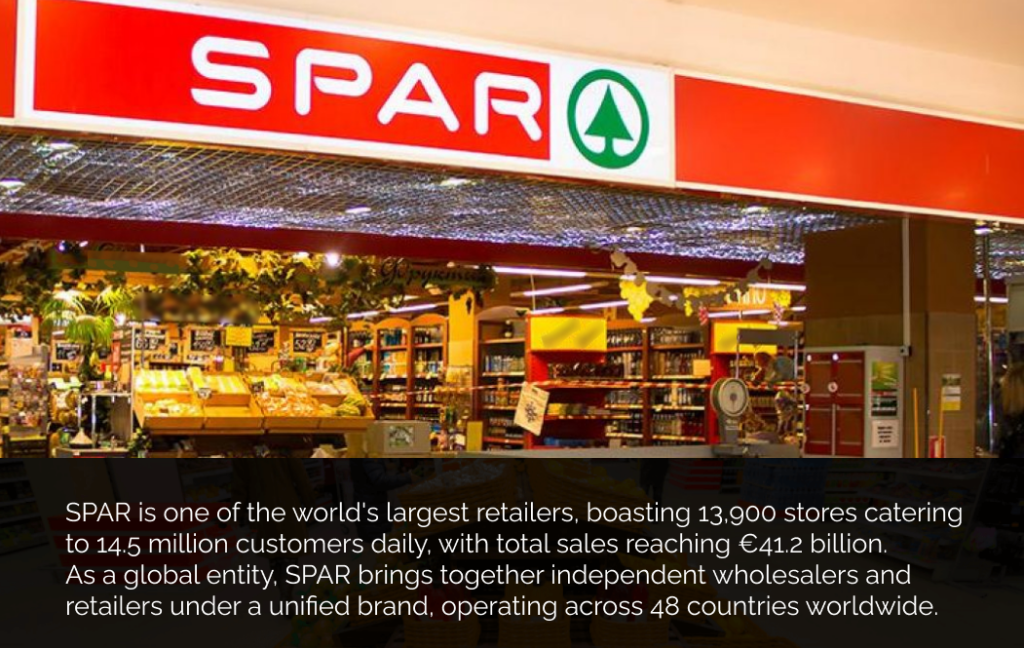Retano SCM was launched in supermarkets of the retailer operating under SPAR brand in one of the Eastern European countries, with a turnover of almost 200 million euros.

Preparation for implementation
Retailer’s project team developed goals and indicated desired results for supply chain automation management project:
- Automate order calculation on all levels of the supply chain;
- Optimize stock in stores and DC;
- Increase of automated ordering and store orders management quality;
- Decrease in waste and logistics expenditures;
Retailer works with 19 000 SKU of active assortment and possesses a high level of process organization. This is why special demands were made not only regarding functional capabilities, but also performance and reliability of the software.
The accuracy of incoming data is crucial for any automation system. This is why to prepare the company for Retano SCM implementation the retailer applied a set of organizational measures to increase the quality of data in the registry system. As a result:
- Incomes are registered on time and stock counts are regularly carried out for problematic products;
- Stock level is always relevant;
- Goods are introduced and withdrawn from stock at the right time and store range is kept in the relevant condition.
Progress of the project
At first, the system was tested on the limited product range for a smooth and painless transition to the new work technology. From May to August of 2017 product categories of “Beer” and “Pasta” were automatically ordered for all stores, without involving distribution centers. As a result, product availability in stores was increased and stock decreased throughout the entire chain.
For “Beer” category:
- Stock before SCM system implementation: Was 25 days — > Became 17 days
- Product availability in stores before SCM system implementation: Was 86% — > Became 96.8%
For “Pasta” category:
- Stock by the end of the period: Was 35 days — > Became 21 days
- Product availability in stores by the end of the period: Was 90% — > Became 95.2%
An increase in these indicators was possible due to the increase in demand forecasting quality. Retano SCM automatically chooses the best forecasting method for every product category based on existing data, stability of sales, forecasting errors and comparisons to factual sales. Now category managers from SPAR receive cleaned sales statistics, eliminating out-of-stocks, promo, clearance and accidental spikes in sales. The system corrects demand forecasts on product categories and calculates the required number of products in the order based on statistics. The job of the stock manager is to approve the precalculated orders. After approval, the SCM system automatically sends orders to suppliers and DCs.
The economic effect of the pilot project satisfied managers. Over the next six months the entire product range was transferred to the automated ordering system.
The system is a decision support tool. it identifies and analyzes supply chain KPIs, allowing the manager to tune replenishment parameters from the same analytical interface.
Retano SCM is designed to work with large quantities of data specific to retailers. This is why the system overtakes more labor-intensive operations, such as calculations for stock replenishment in stores and DCs. Most optimal ways of safety stock calculation are automatically applied for different product groups. As a decision support tool, it identifies and analyzes supply chain KPIs, allowing the manager to tune replenishment parameters from the same analytical interface.
Project results
System automatically forecasts and replenishes stock in the retailer’s entire supply chain.
Orders for stores are automatically generated for the entire range. Less than 5% of regular orders may need corrections. Promo orders make up 20% of regular orders and less than half of them may need corrections.
Before the system implementation, a team of 16 individuals managed store replenishment and supplier orders. With Retano SCM, the time required for order creation was cut in half, enabling the company to allocate its resources more effectively.
Stock for the entire product range decreased from 25.6 days to 20.7 days. The decrease in stock led to the release of additional capital and decreased product waste. Availability of products increased from 78% to 94.3%. The decrease in the number of Out-Of-Stock decreased lost sales and increased the loyalty of customers towards the retailer.
According to the SPAR Project Manager, implementation of the system decreased stock, increased service quality and made order schedule management more comfortable. This, in turn, decreased the number of scheduling confusions, specifically during the temporary transition from direct deliveries to deliveries through DCs.
An economically efficient and balanced supply chain is crucial for any retailer seeking to enhance its business process management. By harnessing the powerful capabilities of Retano SCM in conjunction with continuous collaboration with suppliers to enhance service levels, retailers possess all the necessary tools to improve their supply chain KPIs.
